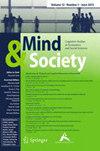Attainment of Moksha in Kashi: A Qualitative Investigation
Q1 Arts and Humanities
引用次数: 0
Abstract
Death-related beliefs and actions have changed over the course of human history. This study is a thematic examination of people who travel to Kashi, the Hindu sacred city, to die at the end of their lives. Pilgrims who arrive in Kashi to die anticipate a specific spiritual recompense called moksha, which is variously interpreted as freedom from rebirth or a good rebirth. This dissertation sought to highlight the sociohistorical epoch defined by a profusion of scholarly literary works on death and dying, as well as a surge in social movements trying to improve the way people die. To acquire a thorough knowledge of the motivations for attaining Moksha, particularly in Kashi, the study utilised a qualitative methodology. Thematic analysis has been used to dive into the perceptions of the participants and present a comprehensive description of their motivation. A semi-structured interview guide based on Indian and western literature reports was employed to obtain data. After interviewing 10 people, theme saturation was reached. Results revealed how Indian philosophical and religious notions, such as Karma, Dharma, Atman, and the concept of rebirth, have a significant impact on Indian perceptions of spirituality at the end of life.喀什地区莫克夏的实现:一项质的调查
与死亡有关的信仰和行为在人类历史的进程中发生了变化。这项研究是对前往印度教圣城克什米尔(Kashi)临终的人的主题考察。来到喀什的朝圣者期待着一种被称为moksha的特殊精神回报,它被各种各样的解释为免于重生或良好的重生。这篇论文试图突出一个社会历史时代,这个时代有大量关于死亡和临终的学术文学作品,以及试图改善人们死亡方式的社会运动的激增。为了全面了解获得解脱的动机,特别是在喀什地区,本研究采用了定性方法。主题分析被用来深入研究参与者的看法,并对他们的动机进行全面的描述。采用基于印度和西方文献报道的半结构化访谈指南来获取数据。在采访了10个人后,主题达到饱和。研究结果揭示了印度哲学和宗教观念,如因果报应(Karma)、达摩(Dharma)、阿特曼(Atman)和重生(rebirth)的概念,对印度人在生命结束时对灵性的看法有重大影响。
本文章由计算机程序翻译,如有差异,请以英文原文为准。
求助全文
约1分钟内获得全文
求助全文
来源期刊

Mind and Society
Arts and Humanities-Philosophy
CiteScore
2.30
自引率
0.00%
发文量
5
期刊介绍:
Mind & Society is a journal for ideas, explorations, investigations and discussions on the interaction between the human mind and the societal environments. Scholars from all fields of inquiry who entertain and examine various aspects of these interactions are warmly invited to submit their work. The journal welcomes case studies, theoretical analysis and modeling, data analysis and reports (quantitative and qualitative) that can offer insight into existing frameworks or offer views and reason for the promise of new directions for the study of interaction between the mind and the society. The potential contributors are particularly encouraged to carefully consider the impact of their work on societal functions in private and public sectors, and to dedicate part of their discussion to an explicit clarification of such, existing or potential, implications.Officially cited as: Mind Soc
 求助内容:
求助内容: 应助结果提醒方式:
应助结果提醒方式:


